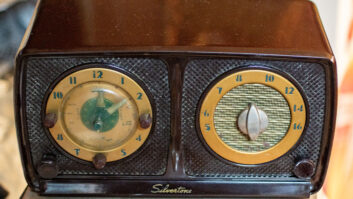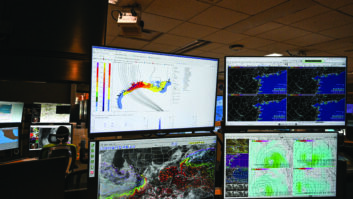(click thumbnail)David Williams
(click thumbnail)Ted Foster
(click thumbnail)Steve George
(click thumbnail)Jeff Bennett
(click thumbnail)Ken Neenan
(click thumbnail)Homer Wilson
(click thumbnail)Richard Petty
(click thumbnail)Charlie Wooten
(click thumbnail)Ken Meek
(click thumbnail)Tom RuskClear Channel’s Award-Winning Engineers
How would you feel if the head of your department sent a memo to your co-workers as well as the top managers throughout your company, singling you out by name for your talent, hard work and dedication from among 750 co-workers? Pretty darn good, I bet.
If the company then sent the announcement to the media, including this newspaper, and posted the news on its corporate Web site, you’d feel mighty proud.
Ten engineers at Clear Channel had that experience recently.
During my decade at Radio World, I have bemoaned a lack of recognition for radio engineers. The problem persists. But I’m pleased to see more exceptions – the recent nod to Steve Griesbach as “employee of the year” at a Cumulus cluster; the new award honoring an outstanding woman in broadcast engineering from SBE and the American Women in Radio and Television.
When we find such efforts, I like to spotlight them.
Regional input
At Clear Channel, a program of naming Radio Engineers of the Year started three years ago under Jeff Littlejohn, who has since been named executive vice president for distribution development. Now the awards are run by Senior Vice President of Engineering Steve Davis.
Davis told me he takes nominations from his nine regional VPs of engineering so each part of the country has a chance to be represented, not only those where, year after year, big storms thrust certain engineers into the spotlight. He also attempts to come up with a list that represents the range of work done by engineers in markets big and small, where the skill sets required are so different. With input from Littlejohn, Davis makes the selections and names a national winner.
When you consider that the company has, very roughly, 750 engineers in 250 markets, to be named to the list is a notable honor.
“I’ve gotten a lot of support from our managers and (Radio President/CEO) John Hogan as well, who backs this,” Davis told me. “Some of the managers said, ‘This is wonderful, there should be a program like this for program directors and traffic directors.’ I leave that to others.”
Winners win free travel, lodging and admission to the NAB convention, where they’ll be saluted at a private gathering. They get a plaque, and Davis will write each a personal letter to save – “Hopefully not to seek another job somewhere!” he said, laughing.
“We talk about the difficulty of finding good engineers. The pay scale is going up; engineers in most markets are fairly paid; but engineers often still feel like the unsung hero at the station. It’s nice to recognize these guys. Engineers are often not singled out enough.”
I agree.
Now, a smart company will pay to send its best engineers to NAB; you don’t need an award program to justify that. (How about a paid vacation for winners?) But the Clear Channel approach to recognizing its engineers is a good one. And if you’re running a large company’s engineering staff, you can’t afford to send every engineer to NAB; you’re already obliged to choose among them. Why not make the trip a prize to be aimed for?
Davis tosses off, almost as a joke, that he hopes winning engineers won’t use the honor to look for work. But let’s face it, a lot of managers think this way: “I’m not going to do anything that will help this engineer find work elsewhere, or call my competitor’s attention to my employee assets,” they might think.
I’m glad Clear Channel is looking beyond such self-serving – and ultimately self-defeating – arguments. The employees who are eager to jump from your ship aren’t the ones you treat well. They’re the ones you treat poorly.
Has the attitude toward engineering changed at Clear Channel? Davis thinks it has, as the mergers that made up the company recede into the past.
“We’ve come to see how important good engineering is to our success and how hard it is to find good engineers. They need to be considered managers; they are crucial to the operation of a station.”
‘Out of the box’
Here are the winners, with excerpts of what Davis and their regional VPs of engineering had to say about them in his internal memo:
Northwest/Sunbelt: “David Williams led the way in 2004 and 2005 with the HD rollout for the entire region … David is consistently thinking out of the box to get things done in the most efficient and economical way. He understands budgets and deadlines. He has spent countless hours in zoning meetings, preparing and presenting exhibits in support of a much-needed tower for our stations. Dave communicates.”
Rockies: “Ted Foster does it all. He is the chief engineer and ops manager. He changes oil in the trucks, cleans the buildings and the transmitters. He runs the board and does remotes and he even has a couple of sales accounts! He is busy all the time and yet found time to get his SBE Certified Broadcast Radio Engineer certification last year. … His GM says she would not know what to do without him.”
Mid West: “Steve George is way above the average in his ability to build and troubleshoot/repair RF issues. He is highly trained and skilled in the area of computers and IT issues. … Steve and Greg Gade have completely rebuilt the Omaha studio facilities, replaced and retuned a tower in the 50 kW KFAB AM array that employs open wire feedline and a vintage phasor. He has worked on implementing HD Radio on both the day and night on KFAB. … Steve is in the middle of constructing a new combined site for KXKT(FM) and KQBW(FM). … He designed the building and the antenna system; worked with the local TV station on the terms of the lease, the tower crew on the coordinating of the antenna installation, with vendors on the equipment; and did the budget planning for this project when it was submitted to San Antonio.”
Central: “Jeff Bennett … runs a top-notch engineering department covering the seven stations in the Dayton, Ohio, market along with one AM in Springfield, Ohio. … Jeff has executed the HD rollout for four of the FMs and added HD-2 to those stations on the accelerated time line set for the end of 2005. Jeff has helped in surrounding markets with emergency issues as they come up where the smaller market does not have the engineering staff … Always thinking of the bottom line for the market and of the quality and reliability of the on-air product.”
Northeast: “Ken Neenan supervises engineering for the state of New Hampshire. He has successfully consolidated two markets: Portsmouth and Manchester; maintains and services nine unique transmitter sites spanning the state and into Maine, and has hired and attracted engineers to radio service who would have otherwise had little interest in our field. … Ken has volunteered his own free time to assist in buildout projects in Albany, N.Y., Binghamton, N.Y. and Boston. He volunteered to help with Katrina recovery efforts and spent a week in New Orleans.”
Mid South: Homer Wilson. “WHUB(AM) lost its tower to vandalism. … Homer and Ben (RVPE Ben Brinitzer) discussed the options and they decided to try and get a long wire mounted on telephone poles. Given the day was a Sunday and a holiday week, it didn’t seem there was much hope of achieving this quickly. … With no on-site help, Homer headed out and found wire at Lowes, spent a few hours stringing it to a tree about 200 feet from the transmitter building and without any test equipment, managed the miracle of getting the station on the air at 50 watts within six hours of the failure. By the next morning the station was operating at 50 percent of its licensed power, tuned correctly into the makeshift antenna. Homer accomplished this without test gear. Within 24 hours after that he had rallied the city to put up two telephone poles and string the permanent wire, and had the station on at full power and a near-perfect antenna match!”
Southeast: “Richard Petty is our market engineer in Baton Rouge. He also oversees our engineering operations in New Orleans. … While we sent a lot of help to Baton Rouge following Hurricane Katrina, Richard was the ‘glue’ that held everything together. At one point, we had 17 stations originating from his studio complex in Baton Rouge! Richard’s role was crucial in making ‘United Radio of New Orleans’ a reality. … There were many heroes in the Southeast Region … as we were hit by four more major hurricanes, but Richard did a yeoman’s job when it comes to going ‘above and beyond’ the call of duty.”
Mid America: “Tom Rusk is our contract engineer in Little Rock, Ark. He built five HD stations in his market at the same time, by himself. All five were substantially completed with almost no outside help. Tom has been with Clear Channel on a contract basis for many years but is more like a full-time employee in terms of his dedication to our stations, his long tenure and the time he puts in. Tom exemplifies the best in contract engineering.”
Southwest: “Ken Meek, chief engineer of our Valley stations in Texas, has been devoted to his craft for over 45 years. … The people around him, whether in sales, programming and management, love working with him. … Ken has moved two stations to new sites and at the same time added four more stations. He even persuaded his wife, since he had no assistant engineer, into helping him wire the facility! …. When they completed the install of the stations the GM was so impressed he gave them both a bonus … he and his wife donated the full amount to the mission across the border for the poor. … Ken’s FMs were the first Clear Channel stations to go IBOC in Texas and are still the only IBOC stations in the valley. He did the IBOC HD2 installs on schedule working overnights even with sickness falling upon him; the day after the install he found he had pneumonia but still was so proud when he finished he called from his hospital bed to tell our RVPE Gil Garcia that everything was complete.”
National Engineer of the Year: Charlie Wooten. “We will all remember 2005 as the year of three devastating hurricanes. Charlie Wooten, our director of engineering in Panama City, Fla., played a major role in keeping our Florida panhandle and southern Mississippi radio stations on the air, and leading the recovery effort, through all of them.
“Sometimes Charlie was drawn into the fray simply because his stations were in a storm’s path. But at other times, when it was clear that his own market would be spared the worst of the storm, Charlie headed into the storms to help our stations stay on the air, and to make repairs and construct makeshift facilities as needed to continue to provide vital service to the communities we serve.
“Many of our other engineers have done the same; however Charlie stands out, not only because of his eagerness to volunteer and head into the most devastated areas, sleeping on transmitter and studio floors, and working unbelievable hours, but because he has already been honored twice by Clear Channel Radio as ‘Small Market Engineer of the Year’ for doing the very same thing for two years running! … He exemplifies the very best in the radio engineering craft: technical expertise, calm and leadership during a crisis, inventiveness and field expediency, and a positive ‘can do’ attitude.”
On the phone with me, Steve Davis gave Wooten the ultimate engineering compliment, calling him “akin to a MacGyver” in his resourcefulness at solving problems.
Tell the world
On March 15 Davis e-mailed the above comments and more to the company’s radio engineers, radio senior vice presidents, regional VPs and general managers.
Thanks to the company’s IT infrastructure, Davis said, he can type an e-mail and reach thousands of people. “It’s almost like running a little newspaper,” he said. “I’m in a good position to publicize this.”
The company also distributed a summary version to the media via its PR firm, and posted it prominently on its corporate Web site. Yes – it paid someone to put out a press release about engineering.
Congratulations to the winners and to Clear Channel’s engineering managers for understanding why this kind of program is so important.
If you are responsible for an engineering department, consider the lessons of this program.
One thing I know: you shouldn’t wait for non-technical ownership or managers to come up with this idea on your own. I sense that these successful award programs consistently are coming from the engineering community itself, which finally has learned that if we want our industry to start respecting engineers more, the initiative will have to come from within.

















